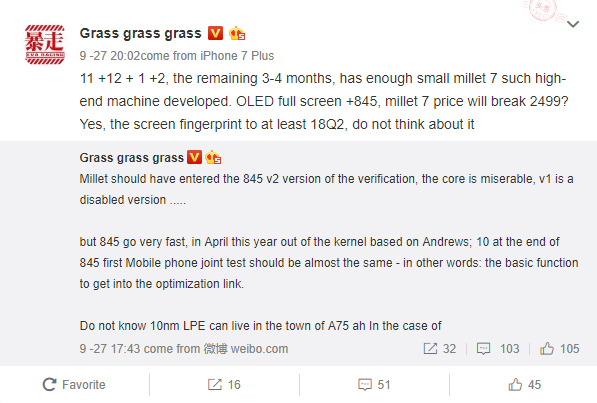Earlier in this month, the rumor mill had revealed the key specs that would be arriving on the Xiaomi Mi 7. The report had revealed that the upcoming flagship phone from the company would be driven by Snapdragon 845 chipset. Today, an industry insider from China has claimed that the Chinese firm and Qualcomm are currently working on optimizing the Snapdragon 845 v2.
He has added the development progress is proceeding at a steady pace as Xiaomi is expected to begin the testing of Mi 7 in November this year. The final testing of Xiaomi’s upcoming flagship may happen in February next year. The Mi 7 may come with a large-sized OLED screen. However, the smartphone is unlikely to feature an in-screen fingerprint reader.

Read More: Xiaomi Reportedly Valued At $69 Billion, May Seek New York IPO
In June, reports had claimed that the upcoming Google Pixel 2 and Pixel 2 XL would be the phones to feature the new Snapdragon 836 chipset. However, newer information has revealed that the Snapdragon 836 chipset does not exist and the next premium SoC from Qualcomm would be the Snapdragon 845.
Rumors have it that the Snapdragon 845 is manufactured by Samsung through its 10nm Low Power Early (LPE) FinFET process. It is speculated to include a combination of Cortex A75 cores, Adreno 630 graphics and X20 LTE modem that is capable of delivering download speed of up to 1.2 Gbps.
The Xiaomi Mi 7 rumors suggest that it will be featuring a 6-inch OLED screen from Samsung. It is expected to support an aspect ratio of 18:9. The Mi 7 could be the first smartphone from the company to carry support for wireless charging.
When it comes to the design, the Mi 7 is expected to feature the same glass and ceramic chassis that is available on the Mi 6. As far as the pricing of the Mi 7 is concerned, it is pegged to cost around 2,999 Yuan for the 6 GB RAM model. Previous reports have suggested that Xiaomi may unveil the Mi 7 in the first quarter of 2018. Rivaling brands like Samsung and LG are also rumored to debut their respective flagships such as Galaxy S9 and LG G7 in Q1 next year.
(source)







